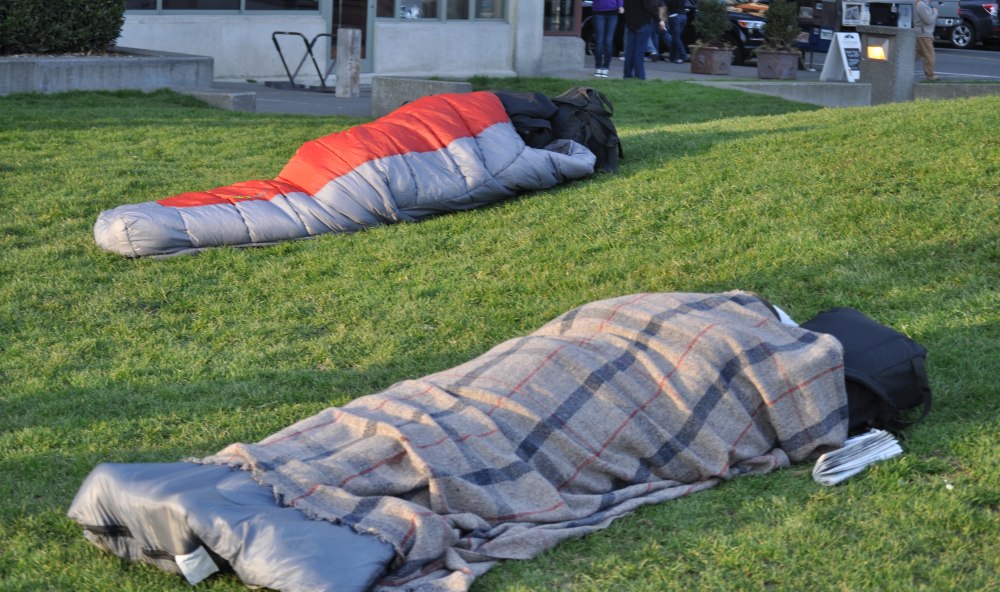
Thatcher Bailey’s last task before he left the Seattle Parks Foundation this past month was to add his signature to a letter addressed to Seattle Mayor Jenny Durkan and the City Council. It urged them to work to solve “a spiraling public health and safety crisis” in Seattle parks.
For the past 10 years, Bailey had served with distinction as the Seattle Parks Foundation president and CEO, a position he calls “my all-time favorite job.” The Foundation helps raise money to refurbish and build new parks around town. Bailey decided to leave when he had an offer to take over as interim executive director at the Friends of Waterfront Seattle. He couldn’t resist the chance to help the city create a new park on the central waterfront.
In signing the troubling “Dear Mayor” letter on behalf of the Parks Foundation, Bailey was joined by more than a dozen citizens representing community councils, neighborhood associations, and business-improvement districts throughout the city. The call to action detailed instances of deteriorating conditions in the most seriously affected parks. Among those cited were Ballard Commons, Junction Plaza, Cal Anderson, Denny, Freeway, and Westlake parks.
At the same time, the letter rightfully expressed concern for the hundreds of unhoused individuals who have congregated in those park spaces. These unsanctioned encampments — technically illegal under city ordinance — are partly due to inadequate shelter space within the city, a second major crisis.
There’s no dispute that homelessness must be addressed and the homeless treated humanely. The city faces the need to provide much more shelter space. The answer lies in producing more small-house villages, more leased and purchased hotel and motel spaces, and encouraging production of even more low-income dwellings across the city.
These twin crises — parks and homelessness — occur at a most unfortunate time. The city has opted to leave unsanctioned encampments mostly in place during the pandemic rather than risk spreading infection. Complicating solutions is the fact that the city budget has taken a blow because of reduced tax receipts. Many other shelter spaces, such as churches and libraries, are also closed by the pandemic.
This ill-starred combination of factors has left numbers of parks dangerous and chaotic at the precise time when people have the most acute need for getting outdoors and for recreation space. The citizens’ letter outlined declining conditions at the most affected parks, perhaps none more so than Cal Anderson Park on Capitol Hill. That inner-city park, ground zero during the CHOP occupation and protests, continues to be the scene of major fires, violent incidents, and threatening behavior toward neighbors. The park’s lights and bathrooms have been damaged and not fully repaired.
After receiving the citizen letter, Mayor Durkan quickly announced a Clean Cities Initiative. She said the city would be spending $5.6 million to combat the crisis of mounting garbage and trash associated with unsanctioned camping. She set up four new “community clean” response teams. They will operate in the city’s four quadrants. One of the foremost aims according to the mayor: To keep parks safe and accessible for all.
That’s hopeful, if slightly overdue, news. Seattle’s parks are fragile. In the past, the city has ranked as one of the nation’s top-ranked parks systems with 93 percent of the city residents living within a 10-minute walk to one of the 485 parks. Seattleites have long believed those parks and playgrounds are essential to their physical and mental health. Polls consistently show 80 to 90 percent support that view. The politically savvy say failure to support parks risks a lost election. Whenever parks have been on the ballot, they invariably win.
When reached at his new job, Thatcher Bailey summed up the situation this way: “We have two crises — parks and homelessness. We must solve them both. But we cannot expect to solve the one crisis on the back of the other.”
Discover more from Post Alley
Subscribe to get the latest posts sent to your email.

Another insightful piece Jean! I think the Number 1 problem facing this city right now is homelessness. We have a parks problem because of our homeless problem. The mayor should personally reach out to our billionaires and ask them to step in and solve this. Money is the answer. We need to replace the cheap housing we used to have in this city that was torn down to build condos and modern apartment buildings. Money can be used to give the homeless vouchers, subsidize the building of housing, grants to non-profits to build little houses, etc. etc. It’s a massively complicated problem requiring multiple approaches. But if we have the money we can solve it. Billionaires: WE NEED YOUR HELP!
Money is not the answer ! San Francisco has spent billions for 40 years now and housed 20,000 vagrants and has only been rewarded by more street vagrants than ever! The nicer we treat street vagrants , the more we will get. I was just in Spain, They never allow vagrants to congregate or pitch tents and have no in your face vagrant camps anywhere! They stop the vagrant problem BEFORE it becomes a cancer on society. Giving them love and compassion even their own families will not, just encourages them and the destruction and decay.
We need housing throughout the region, not the city, and a by-name, coordinated response. Seattle is being asked to shoulder, physically and financially, a regional problem. Per the PIT counts, we have 30% of King County residents and 70% of of the homeless. Surrounding communities don’t provide sufficient services. The new KC Regional Homeless Authority is funded 67% by Seattle and 33% by KC. The damage encampments done to wooded areas of parks, due to soil compaction, will take generations to recover. The great majority of the homeless need addiction treatment. See this report on the Navigation Team clean ups in city parks. https://www.speakoutseattle.com/earth-day-call-to-city-council-nurture-seattle-parks-every-day/